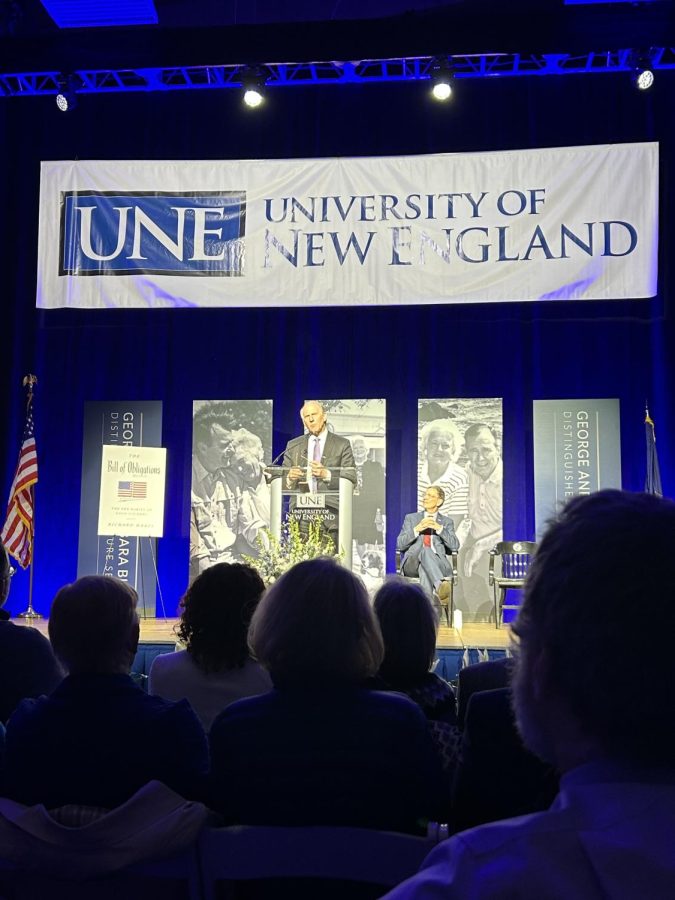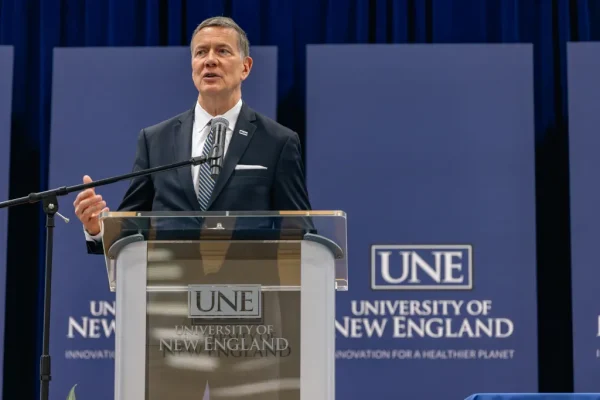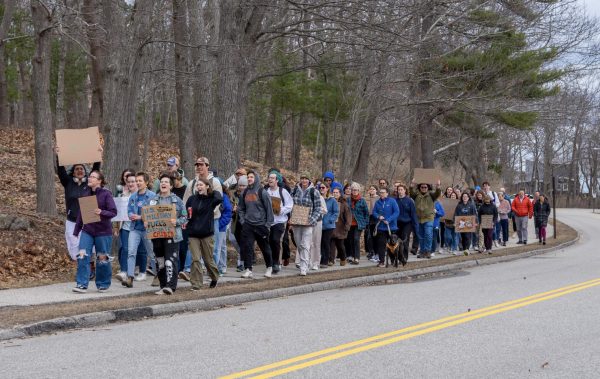UNE Holds 12th Annual Bush Lecture Series
Richard Haass visits UNE on March 23rd, 2023 to present the 12th annual George H.W. and Barbara Bush Lecture Series.
On Thursday, March 23rd, UNE welcomed Richard Haass, world-renowned president of the Council on Foreign Relations for now 20 years. Not only this, but Haass also has an extensive background in Washington D.C., working under multiple presidents including Ronald Reagan, Jimmy Carter, and both Bush administrations.
Highlighted aspects of Haass’ list of achievements include but are not limited to his position as U.S. envoy for the Cyprus negotiations, another envoy position during the peace process in Northern Ireland, and the U.S. Coordinator for the future of Afghanistan post 9/11.
In his commitment to our democracy, Haass has been presented with multiple awards for his work. These awards and acknowledgments are compiled of the Presidential Citizens Medal, the State Department’s Distinguished Honor Award, and the Tipperary International Peace Award. As one can see from his laundry list of both experience and achievements, Haass is an important and honorable member of our current democracy.
The day began for Haass in a private luncheon with students selected from the School of Arts and Humanities at noon. Taking place in the George and Barbara Bush Center located in the Biddeford Campus Library, students were able to ask questions about Haass’s work and his new publishing. Following the luncheon, at 5 PM, Haass spoke at the Lecture Series event in the Harold Alfond Forum on Biddeford Campus.
Haass’ visit to UNE centered around a conversation with students, faculty, and staff regarding his new book, The Bill of Obligations: The Ten Habits of Good Citizens, and how American citizens can participate in our democracy every day. This is known to be Haass’ twentieth book he has published regarding either foreign relations or management. Published in 2023, Haass wrote most of his book based on his previous publication, Foreign Policy Begins at Home.
In talking about his intentions in writing this, Haass wanted to provide a book for all American citizens, regardless of political knowledge, background, or opinion. He strategically wrote his book so it could be digested by every individual and not just by the experts. One of Haass’s main intentions for The Bill of Obligations was for it to act as a call to action for all U.S. citizens.
Haass finds that our political sphere is more divided, and more complicated to understand than previously ever. Therefore, his solution to the current political divide was to write this book. He felt that writing this was a duty and obligation he had toward Americans. If America is as divided as Haass puts it, then it is easy for an individual to be lost in political navigation and participation. The Bill of Obligations is meant to ease the anxieties of citizens and guide them to being active participants in democracy.
When asked what obligation he considered most important, Haass stated that being an informed citizen is of utmost priority. This is only one of ten obligations he identifies as key players in our civic responsibility as Americans.
Moving towards his future, Haass has recently stepped down from his position as President of the Council on Foreign Policy. Regardless of his stepping down, Haass still remains motivated and ambitious about his participation in democracy. He plans to continue writing, visiting schools, and giving speeches about foreign relations and civics education. Along with this, he will continue to help corporate companies with foreign relations and international business relationships.
Haas leaves students with a lifelong ticket of advice on how life happens while you’re planning it, and that education is a never-ending continuous process. The Bolt would like to thank Haass for his time at UNE and his dedication to not only foreign relations, but democracy as a whole.








